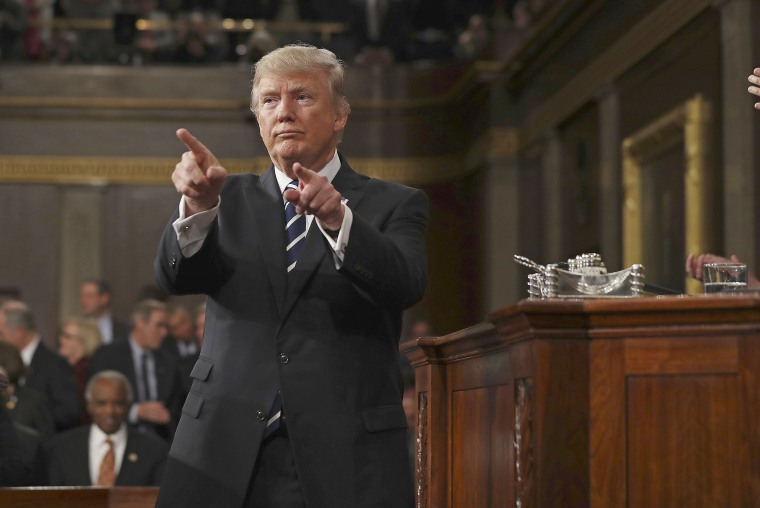The day after President Donald Trump's first speech to Congress, his allies on Capitol Hill said that his remarks show that he has no intention of pursuing legal status for the majority of undocumented immigrants.
Rep. Trent Franks, R-Arizona, a member of the House Judiciary Committee, said that anything akin to the 2013 bipartisan "Gang of Eight" immigration bill, including a path to legalization for the 11 million undocumented immigrants, is unlikely.
“I don't think the central thrust of [a potential immigration compromise] will be like the Gang of Eight,” Franks said.
Some path to legalization, however, has been part of compromise legislation for decades. And Trump seemed to signal that he was open to the idea on Tuesday when he told reporters before his speech that he was willing to consider legal status for undocumented immigrants who haven't committed serious crimes.
“The time is right for an immigration bill if both sides are willing to compromise,” Trump said.
Such a statement would have represented a major shift in his administration's immigration policy.
But in his speech, Trump said: “I believe Republicans and Democrats can work together to achieve an outcome that has eluded our country for decades.”
There was no mention of the possibility for legal status, encouraging his hardline immigration supporters on the Hill who say the absence proves that he has no plans to provide a path to legalization for undocumented immigrants.
Under Trump, a compromise would be more likely to include relief for a small portion of undocumented immigrants living in the U.S. — most likely the DREAMers, who many admit have the most compelling case for leniency because their parents brought them to the U.S. as children.
Offering a path to legal status would go against much of Trump’s campaign promises as well as his domestic agenda, which revolves around the perceived pitfalls of immigration. His staff is populated with advocates who believe that both legal and illegal immigration are detrimental to American workers. They include new Attorney General Jeff Sessions, top adviser Steve Bannon and adviser and former Sessions staffer Stephen Miller.
“Protecting our workers also means reforming our system of legal immigration,” Trump said Tuesday.
Advocates aligned with Trump say that before any compromise with the DREAMers, the border must be secure, the current immigration laws would have to be enforced, further enforcement mechanisms must be implemented and the legal immigration system must be reformed. Trump has vowed to build a “great wall” along the southern border and is expected to ask Congress for an emergency funding bill this spring worth billions to begin the current wall’s expansion. He has already begun aggressive deportation of undocumented immigrants, which he says prioritizes those that have committed crimes.
He is expected to push for the Congressional passage of E-verify, a workplace verification system that ensures that employees are legal residents.
And he proposed the fourth prong critical to his immigration plan Tuesday when he pushed for the reformation of the legal immigration system.
He proposed changing the legal immigration from family-based, meaning that relatives of immigrants are granted preference into the U.S., to a merit-based system, where a person is accepted based on skills and need.
“It will save countless dollars, raise workers’ wages, and help struggling families — including immigrant families — enter the middle class,” Trump said of his plan.
"If E-verify and ending the chain migration is done, then DACA kids could get amnesty," said Roy Beck, president of Numbers USA, a group that supports the reduction of legal immigration.
Sen. David Perdue, R-Georgia, co-sponsored a merit-based immigration bill in the Senate. He said that the White House is on board with his bill. And while Trump didn’t mention it Tuesday, Perdue said that the White House is supportive of the byproduct of his bill: Reducing legal immigration.
“I won’t call it coordinated, but they were consulted. And certainly they are in agreement to an approach like this to get legal immigration more back to the 100-year historical norm and that’s all this bill does,” Perdue said.
Perdue’s bill, which is also co-sponsored by Sen. Tom Cotton, R-Arkansas, would reduce legal immigration from 1.2 million people per year to about 450,000 people.
Beck said Trump’s merit-based immigration proposal was “a big deal.”
“I’m not sure that any president has addressed Congress about the need to make that kind of change in legal immigration at least for 90 years,” he said.
While immigration has split Republicans for years, many say they could support changing the legal immigration system, but some caution against any plan that would reduce the number of legal immigrants.
“I see nothing particularly wrong” with the current number of legal immigrants coming into the country each year, said Rep. Darrell Issa, R-California.
More broadly, Republican advocates of immigration reform, including a path to legalization, say they could get on board with Trump’s ideas if legalization is included.
“Whether it’s a path to citizenship or a path to legal status we can work with both of those,” said Sen. Jeff Flake, R-Arizona.

